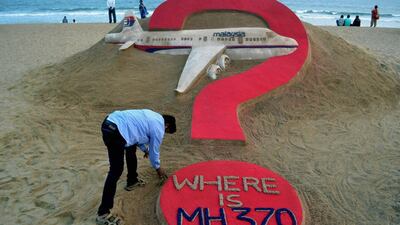Just before 1am on March 8, 2014, 239 passengers and crew took off from Kuala Lumpur on Flight MH370 bound for Beijing. One year later, we have no firm evidence of exactly what happened after contact was lost with the plane. To the enduring anguish of the next of kin, the whereabouts of the Malaysia Airlines Boeing 777 and the fate of those aboard remain a mystery.
Many deaths, especially those that are not natural, strike those left behind as almost incomprehensible. Few can manage their grief as the remarkable Palestinian surgeon Izzeldine Abuelaish has done. He lost three daughters to Israeli attacks on Gaza, but still campaigns for reconciliation between Palestinians and Israelis and wrote a book titled I Shall Not Hate.
But back to mysterious deaths. A recently published book on the sinking during the First World War of the Lusitania, once the largest passenger ship in the world, raises questions about how and why it went down. A German U-boat had holed it with a torpedo, but it was an unexplained second explosion that caused the liner to submerge, drowning just under 1,200 people.
One Friday in August 1996 my friend Robert Tewdwr Moss, a well-regarded young UK journalist, finished the final draft of Cleopatra’s Wedding Present, a travelogue on Syria that went on to garner much praise. But the accolades were posthumous. That very same evening an acquaintance and his companion joined Robert for drinks in his flat. He was beaten and bound, robbed and left to suffocate to death, a sock shoved into his mouth.
Natural disasters, from earthquakes to tsunamis, can lead to people questioning how God can allow such events to happen. Such losses are close to unbearable, especially at the time. It is natural to ask “why?”, and to refuse to find finality in any answer. But in the long term, there are chains of causality that provide explanation – acts of war that claim the lives of innocents, movements in the earth’s crust that provoke catastrophe, man’s greed and his carelessness to the fate of his fellow man. The callousness or lack of morality involved may make motivation seem elusive but at least there is an event or an act, and a consequence. We do know “how”.
With MH370, the relatives know neither the “why” nor the “how”. There is no clear, unchallenged explanation at all. And there may never be. This is why there have been so many conspiracy theories, and so much anger from the next of kin. The initial response may have been slow and not managed as well as it should have been. But ultimately, a huge search operation has taken place, and tremendous effort has gone into combing a vast area of the ocean off the Australian coast where the plane is thought to be located. The interim report released on Sunday, however, provides little consolation for the relatives because, while it identifies some mistakes none could have contributed to the aircraft’s disappearance.
In January, Malaysia’s Department of Civil Aviation officially declared the event an “accident”, so that the families could claim compensation. On Sunday, the prime minister, Najib Tun Razak, expressed a shared sorrow about the fate of those on board. Given that Mr Najib himself lost a relative, his step-grandmother, in another airline tragedy last year (the shooting down of MH17 over Ukraine) no one should doubt his sincerity.
But those who are suffering what psychologists refer to as “ambiguous loss” – that which occurs without verification of death or other means of closure – are still angry. Many insist that there must be some kind of cover-up: that someone, somewhere, knows something.
The truth may be, however, that no one does. It is hard to accept in the age of CCTV, cyber-spying and of mobile phones that seem to be able to pinpoint our every action and location. But it is a reminder of the limits of our comprehension.
For all that we think we are the masters of the planet today, much of the oceans – up to 90 per cent, according to some estimates – are unexplored. Our knowledge, such as it is, is based to a huge degree on empirical observation and does not admit to the certainty of logical abstraction. Human life and creation itself are a mystery: one for which religion provides explanation, but not one that can fully be comprehended by mankind. The monotheistic faiths all hold that although some of the attributes of God can be understood, his essence is beyond human mental capacity. As Hamlet says to his old schoolmate: “There are more things in heaven and earth, Horatio, than are dreamt of in your philosophy.”
In decades past, there was a vogue for suggesting that enigmatic vanishings might be attributed to supernatural or otherworldly forces, as in the case of the Bermuda Triangle. But that fad passed, after being conclusively debunked.
Today, the relatives of those on MH370 must do without the consolation of even semi-plausible theories. In a world in which we think nothing is beyond humanity’s reach, they have been brought face to face with the unpalatable fact that our powers have boundaries. There are still things which we do not, and may never, know.
Sholto Byrnes is a Senior Fellow at the Institute of Strategic and International Studies, Malaysia


